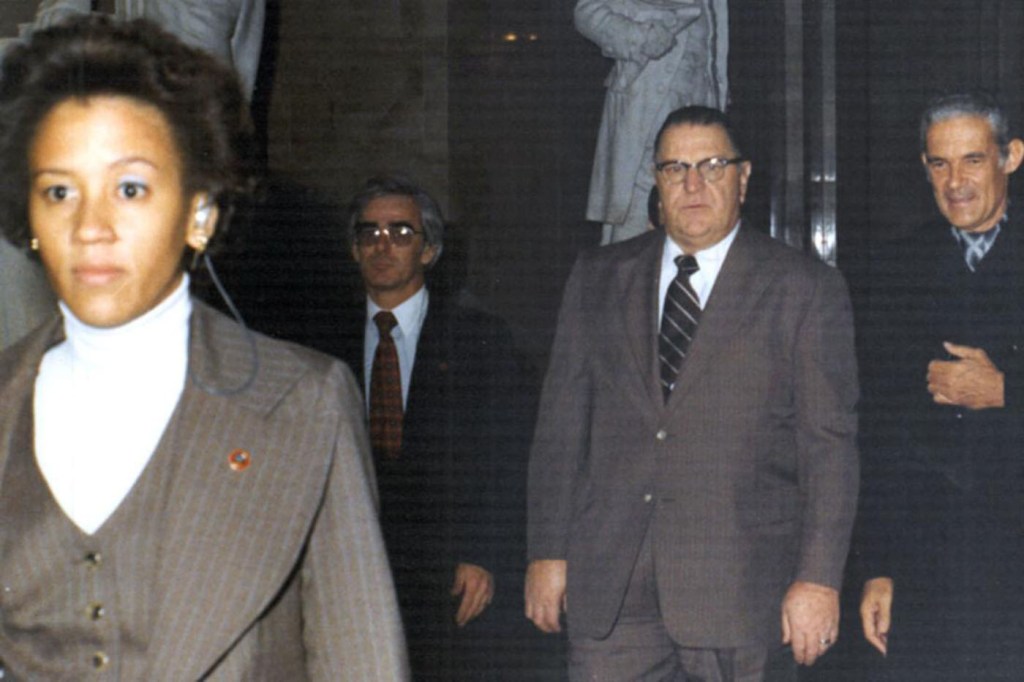A ‘forgotten pioneer’: Northeastern graduate Zandra Flemister was a trailblazer, the first Black woman to serve in the US Secret Service

One year before Zandra Flemister, the first Black woman to serve in the U.S. Secret Service, joined the federal agency, blazing a trail for other women in a historically white institution, she was a Northeastern University student.
Flemister, who died on Feb. 21, graduated with her bachelor’s degree in political science in 1973. On Aug. 5, 1974, she was appointed as a special agent assigned to the Washington field office, where she served until her resignation in June 1978.
In the days since her death, Flemister has come to be seen as a “forgotten pioneer” for women and minorities, battling adversity in the Secret Service before discovering a lifelong passion for public service in the U.S. State Department, says John Collinge, Flemister’s husband.
“I’ve had so many people reach out and ask about her,” Collinge told Northeastern Global News.
Collinge said his wife was attracted to Northeastern because of the opportunities the university afforded her through its signature co-op program.
“She went to Northeastern because she had to go to a school where there was some scholarship aid, but also the ability to do some kind of work-study,” Collinge says.
While at Northeastern, Flemister had a variety of jobs, including working in the alumni office and as a receptionist, Collinge says. She was also a “dormitory counselor,” which included working stints at a desk by the dorm’s front door. While a student, she traveled to the former Soviet Union, among other places—trips that would foretell a career with the U.S. Foreign Service.
“I’m always fascinated by how the legacy of the Black experience at [Northeastern University] is rich with people like Zander, who come through here, get the degree and unassumingly go about their lives to do some amazing things,” says Richard O’Bryant, director of Northeastern’s John D. O’Bryant African American Institute.
Being the first woman of color to serve in an agency once widely accused of fostering a racist culture, Flemister regularly experienced racism and discrimination, according to The Washington Post. She left the Secret Service as a result, joining the U.S. Foreign Service, where she served on postings around the world, including “as consul general in Islamabad, Pakistan, and in Washington as the senior State Department representative at the FBI’s Terrorist Screening Center,” according to the Post.
After leaving the Secret Service, Flemister detailed in legal documents how the agency prevented her from enhancing her career; how her “credibility and competency” was “constantly questioned.”
“I remained in the Secret Service because I wanted to be a trailblazer for other African-American women,” she wrote in an affidavit that was part of a class-action lawsuit filed against the Secret Service in 2000, according to The Washington Post.
The suit alleged “rampant racial discrimination” within the Secret Service. The agency ultimately settled with plaintiffs for $24 million in 2017. According to The Washington Post, the agency’s rate of retention of African American women was so abysmal that by 2001, not a single Black female agent had stayed in the service long enough to retire.
In a statement, the head of the Secret Service acknowledged Flemister’s pioneering role within the agency, saying that she inspired future generations of agents.
“The strength of the Secret Service is predicated on the diversity and experience of our workforce,” Kimberly Cheatle, director of the United States Secret Service, said. “Special Agent Flemister was a trailblazer who dedicated her life to service and inspired a future generation of agents.”
Flemister suffered from Alzheimer’s disease—a fact Collinge wrote about eight years before her death in a moving tribute to the pair’s relationship.
“Alzheimer’s creeps up and envelopes like the fog. In most instances there is no knowing why, certainly not in Zandra’s case where there was no family history of dementia,” Collinge wrote for the American Foreign Service Association. “Zandra led a controlled-stress life typical of a Foreign Service officer in this age of terrorism. She added juggling a career and raising a moderately autistic son.”
Tanner Stening is a Northeastern Global News reporter. Email him at t.stening@northeastern.edu. Follow him on Twitter@tstening90.






